Beth Kephart's Blog, page 80
July 15, 2014
Project Flow at the Water Works: Did I love them? Oh yes, I loved them. But more on all that soon.
Published on July 15, 2014 13:02
when it is time again to teach I turn to the poets
 and, always, there, I find what I didn't know I was searching for.
and, always, there, I find what I didn't know I was searching for.In the dark hours of this cloudy day, just ahead of the morning I will spend with the seventh graders of Project Flow at Philadelphia's Water Works, I turned to Kate Northrop, Stanley Kunitz, Seamus Heaney, Mary Oliver, Ted Kooser, and Greg Djanikian and found:
* a title that leads me toward a game
* a scene that leads me toward a prompt
* a pair of divine metaphors
* a myth that will inspire myths
Whoever thinks poetry is superfluous has not spent a morning with children.




Published on July 15, 2014 04:05
July 14, 2014
The Sixth Extinction: An Unnatural History/Elizabeth Kolbert (thoughts)
 In Alaska you see not just the glaciers, but where the glaciers so recently were—the stones scraped back as the ice retreated, the rocks barren and unsure.
In Alaska you see not just the glaciers, but where the glaciers so recently were—the stones scraped back as the ice retreated, the rocks barren and unsure.You are told stories about the ravages left behind by ocean-scraping shrimping technology, about the muck of salmon farms, about the flowers that haven't bloomed yet, perhaps won't.
You see brilliant sunflower starfish, and you are told they are dying.
You see a sea lion choking on a fisherman's net, and you groan, and you are told, "Do you eat fish? If you do, you are partly responsible."
You see children loving the world as the boat glides by, and you want this world for those children.
You see your own face reflected up from the 38-degree sea. You, photographing the blues and purples, the otters and the whales, the mist. You, seeing.
You love this earth. You love it fiercely. And your heart is breaking.
Among the many brilliant writers who have been exhorting us to care more deeply for the world is Elizabeth Kolbert, whose work calls out to us from the pages of The New Yorker, and whose books, Field Notes from a Catastrophe and The Sixth Extinction, are brutally honest and devastatingly clear.
Humans have marched themselves up to the precipice. We are standing on the cliff. We are still not doing what needs doing. Despite the fact that the glaciers are dying, the seas are rising, and nations are disappearing. Despite the fact that super storms blow in now with terrible regularity—proof of all the acid we've dropped into the sea, proof of the power of sea inches.
I don't mean to lecture. I'm not a scientist. I read. I urge you to read Elizabeth Kolbert. I give you this, the final paragraph, of The Sixth Extinction.
There are choices, still, to be made:
Obviously, the fate of our own species concerns us disproportionately. But at the risk of sounding anti-human—some of my best friends are humans!—I will say that it is not, in the end, what's most worth attending to. Right now, in the amazing moment that to us counts as the present, we are deciding, without quite meaning to, which evolutionary pathways will remain open and which will forever be closed. No other creature has ever managed this, and it will, unfortunately, be our most enduring legacy. The Sixth Extinction will continue to determine the course of life long after everything people have written and painted and built has been ground into dust and giant rats have—or have not—inherited the earth.




Published on July 14, 2014 05:58
July 13, 2014
My Chicago Tribune Review of Jennifer, Gwyneth, & Me (Rachel Bertsche)
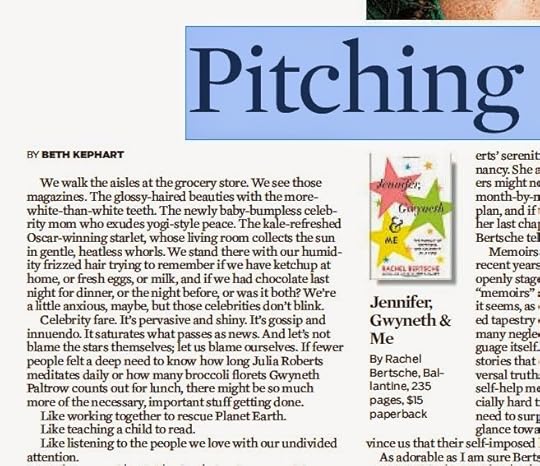 Readers of this blog know that I take no pleasure from reviewing books that dodn't turn out to be quite my kind of book. I know how hard writing is. I know how big the hopes of writers are. I am the last person in the world who wants to disappoint, or hurt.
Readers of this blog know that I take no pleasure from reviewing books that dodn't turn out to be quite my kind of book. I know how hard writing is. I know how big the hopes of writers are. I am the last person in the world who wants to disappoint, or hurt.But when reviewing for the Chicago Tribune's Printers Row and elsewhere, my first responsibility is to the readers. And so I admit that I was challenged by this new immersion memoir by Rachel Bertsche, despite the fact that I suspect that the author herself is kind and openhearted.




Published on July 13, 2014 04:22
July 12, 2014
the many moods of Alaska: a pictorial

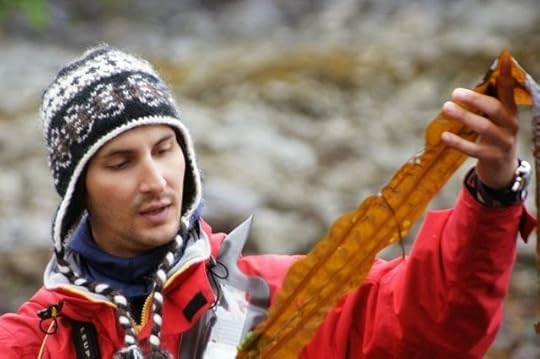
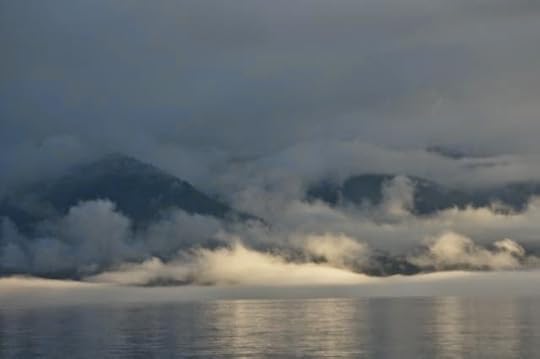
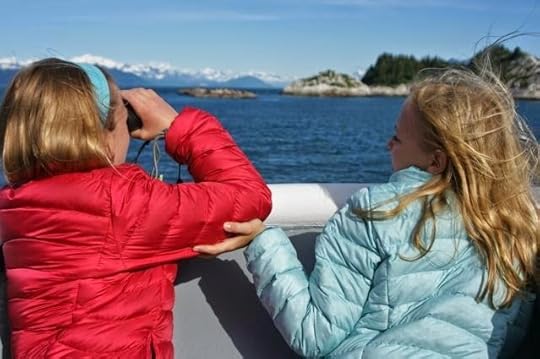



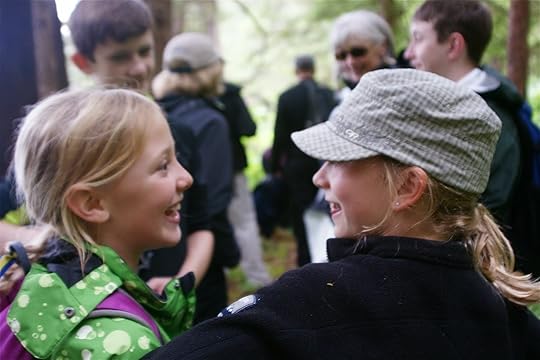
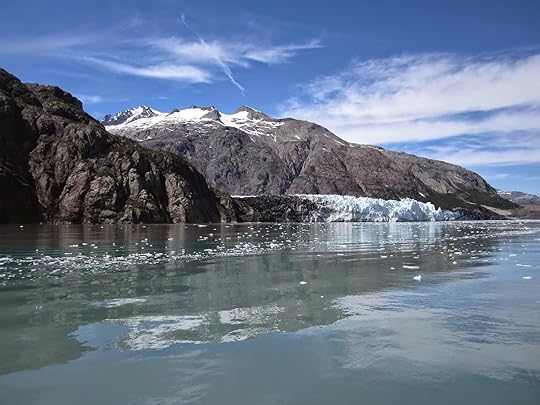
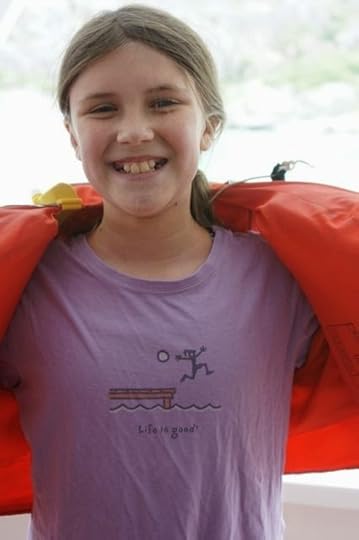 It was the color. It was the conversation. It was the children. Yes, Elly P. Life is good.
It was the color. It was the conversation. It was the children. Yes, Elly P. Life is good. And all thanks to my father, whose gift this trip was.
(A few additional scenes here.)




Published on July 12, 2014 04:31
July 11, 2014
Deep: Freediving, Renegade Science, and What the Ocean Tells Us About Ourselves/James Nestor: Reflections
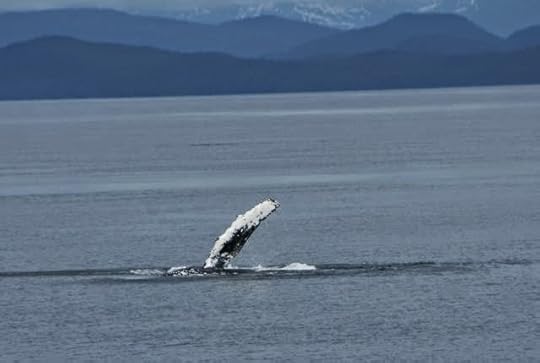 I carried James Nestor's DEEP to Alaska so that I might learn more about the seas. The oceans that gave birth to us, the darkness where strange life hovers, the gigantic brain of the elusive sperm whale, the unbelievable feats of divers who compete against themselves and their own bodies to dive thirty stories or more on a single lungful of air. (They dive; they must return; they cannot breathe until they do; they bleed; they lose consciousness; they dive again.)
I carried James Nestor's DEEP to Alaska so that I might learn more about the seas. The oceans that gave birth to us, the darkness where strange life hovers, the gigantic brain of the elusive sperm whale, the unbelievable feats of divers who compete against themselves and their own bodies to dive thirty stories or more on a single lungful of air. (They dive; they must return; they cannot breathe until they do; they bleed; they lose consciousness; they dive again.)I had been drawn to the book by the New York Times review. I found myself wavering as I read. Intrigued by the content and by our mighty oceans. Feeling boxed in or boxed out by the format. Nestor is a journalist. His book is a first-person exploration organized around sea-level depths. What is discovered 60 feet down, 300 feet, 650 feet, 800 feet down, say. The researchers who are trying to understand. The divers addicted to compression.
There's much to be gained, imagined, felt from a book like this. And Nestor certainly has done his research, is sincere in his desire to meld with his subject matter, is enthusiastically participative. But by organizing this discussion of the ocean around Nestor's own experiences, by writing, mostly, in a clipped present tense, Nestor at times delivers fragments where they might be wholes, more about himself than we might, in this case, need, details that seem out of place.
The book, for example, begins like this:
I'm a guest here, a journalist covering a sporting event that few people have heard of: the world freediving championship. I'm sitting at a cramped desk in a seaside hotel room that overlooks a boardwalk in the resort town of Kalamata, Greece. The hotel is old and shows it in the cobweb cracks along the walls, threadbare carpet, and dirt shadows of framed pictures that once hung in dim hallways.Later, this:
It takes fifteen hours, three meals, four small bottles of wine, seven films, and five trips to the bathroom to fly from San Francisco to Sydney, Australia. Next, there is a four-hour layover in Sydney International Airport (one bagel, a twenty-minute nap on the floor, one bag of cashews, forty-five minutes at the newsstand reading Rolling Stone) before the connecting flight to Saint-Denis, the capital of Reunion.....There is more of this sort of thing—a lot of it, in fact—woven in between the interesting histories of oceanic research and the images of the wily creatures of the deepest depths. As a reader interested in oceans, I learned. As a teacher of memoir who celebrates the first-person voice, I wondered, often, whether a book like this was a proper use of the first-person present. Would a different tense have allowed the ocean to take center stage? Would a close-over-the-shoulder third person have given Nestor more room to make this an even greater, more sweeping study of the seas?
So much, always, to ponder.




Published on July 11, 2014 06:50
July 10, 2014
Dept. of Speculation: Jenny Offill/Reflections
 Among the writer friends whose recommendations I instantly trust is Katrina Kenison, whose memoirs have inspired countless readers and whose many years as both an editor of books and the series editor of Best American Short Stories refined, or perhaps announced, her exquisite readerly sensitivities.
Among the writer friends whose recommendations I instantly trust is Katrina Kenison, whose memoirs have inspired countless readers and whose many years as both an editor of books and the series editor of Best American Short Stories refined, or perhaps announced, her exquisite readerly sensitivities.One day before I left for Alaska, Katrina wrote me a note including this line: Have you read Dept. of Speculation? That's my latest favorite. Also very short, but oh, piercing.
So of course I ordered Jenny Offill's newest novel at once. I read it before the plane left the ground.
Forty-six chapters in 175 pages. A Carole Maso, Kathryn Harrison, or Cynthia Reeves like intensity. A woman broken and her story broken and each brief paragraph like a scream from the deep dark of a well. Help me. A late-in-the-game inversion of point of view that knocks the reader around and carries the story to an even higher plane.
Our narrator is a woman who half loved, then loved, then married, then had a baby with swirls of hair on the back of her head, then watched that marriage fall apart. Our narrator is a woman who is trying, before our very eyes, to regain her footing, to know who she is, to find a rope in the well. Our woman is so stunned by the cruel possibilities of life that she can barely speak more than a few sentences at once.
Example of a single paragraph, cordoned off by white space:
A thought experiment courtesy of the Stoics. If you are tired of everything you possess, imagine that you have lost all these things.
Example of another single paragraph:
Sometimes she will come in complaining about seeing things when she closes her eyes at night. Streaks of light, she says. Stars.It's like this, in Dept. of Speculation. It's harrowing and brave and (to my way of seeing) deliciously odd. It feels uncalculated (though of course it isn't) and raw (though a book like this takes extraordinary refinement and planning). It feels alive and desperate and worried through, and don't we all have times like these, and doesn't that make this fiction true?
Yesterday I wrote of a long book of many chapters—the fantastic Anthony Doerr. Today I wrote of a short book of many chapters—the brave and talented Jenny Offill. Tomorrow, here, I will write of a more ordinary book, one that I didn't read breathlessly during my time away.
What do we have as readers? We have choices. Is there anything sweeter than that?




Published on July 10, 2014 03:53
July 9, 2014
All the Light We Cannot See: Anthony Doerr (Reflections)
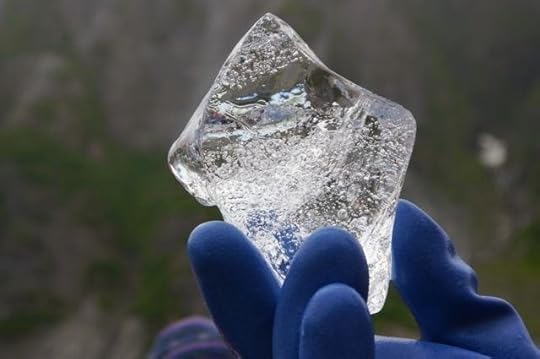 In Alaska, a new friend asks me what I am reading and I say Anthony Doerr, All the Light We Cannot See. I show her the book's first page, and she says, "Read it to me. Out loud." I demur. She insists. I read. In the belly of the boat while the glacial mountains float by. "Leaflets," I say, reading the chapter title. Then:
In Alaska, a new friend asks me what I am reading and I say Anthony Doerr, All the Light We Cannot See. I show her the book's first page, and she says, "Read it to me. Out loud." I demur. She insists. I read. In the belly of the boat while the glacial mountains float by. "Leaflets," I say, reading the chapter title. Then:At dusk they pour from the sky. They blow across the ramparts, turn cartwheels over rooftops, flutter into the ravines between houses. Entire streets swirl with them, flashing white against the cobbles. Urgent message to the inhabitants of this town, they say. Depart immediately to open country.I hear my own breath catch. I look up into Kristi's face. She isn't sure, quite, about the passage I've read, wants to know why it has enchanted me. I read phrases out loud again, verbs, that word incendiary webbed into the lush lyric of the cartwheels, the flutter. How can you speak about what you love? How can you convey the genius of Anthony Doerr, who has never been more genius than this new novel of his—541 pages long, ten years in the making, and it reads too fast, you could read it in a day, you cannot read it in a day, for there will be nothing like it again or soon. Doerr is like Ondaatje, Doerr is like McCann, Doerr is like McDermott, Doerr is like Hagy, Doerr is a writer, pure.
The tide climbs. The moon hangs small and yellow and gibbous. On the rooftops of beachfront hotels to the east, and in the gardens behind them, a half-dozen American artillery units drop incendiary rounds into the mouths of mortars.
And this new book—about a blind girl in France and a smart boy in Germany and the war that brings them together but only after terrible journeys and terrible losses and only for a moment—this new book is wrenching and glorious. Wrenching first. Glorious because of its deep and tender soul. Because Doerr embraces life even in the midst of dying. Because Doerr inclines toward science as he writes his art, which is to say that he inclines toward the curious mysteries of our world. Snails. A massive diamond. Electromagnetic waves. The cell that divides and divides again, until it is a human, howling.
I love this book. I believe in it, wholeheartedly. I believe in Doerr. Why do books still wear labels—YA or A, historical or contemporary, literary or not? Banish them. Now. Anyone who loved The Book Thief will be astonished and grateful for this book. Anyone who swoons over an Ondaatje sentence will recognize the power here. Anyone who wishes to return to France or Germany at the time of a devastating war will be returned in a fresh way, an eyes wide-open way.
Anyone who reads will emerge brokenhearted but also grateful that Doerr doesn't just break our hearts. In surprising and redeeming ways, he heals them, too.




Published on July 09, 2014 06:12
July 8, 2014
In Alaska: the moral of the story is don't smoke cigars (listening to what our readers want)
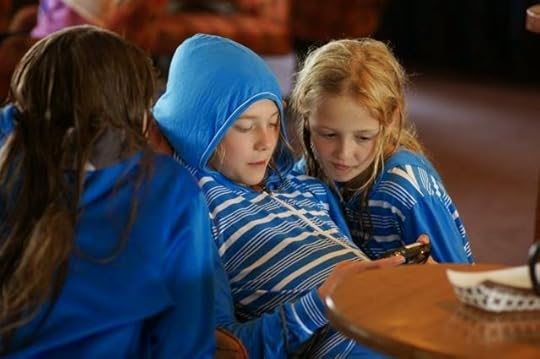
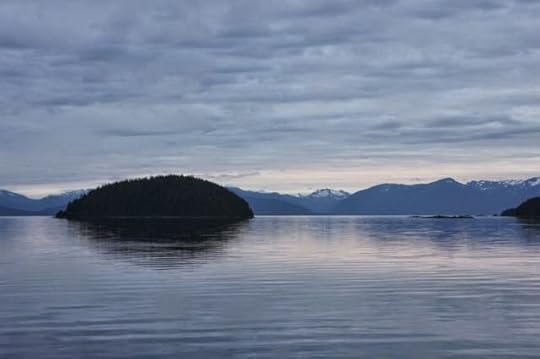
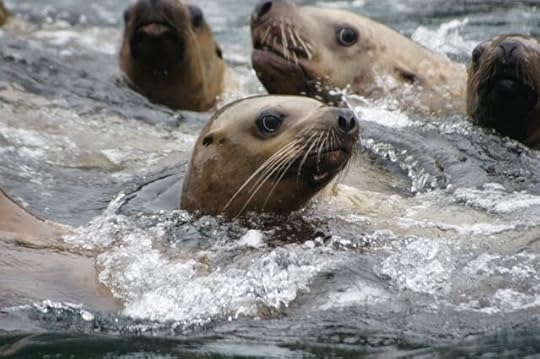
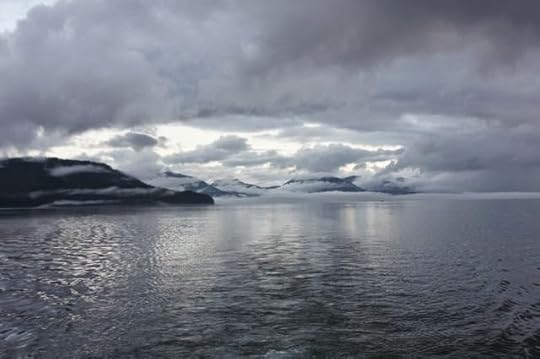

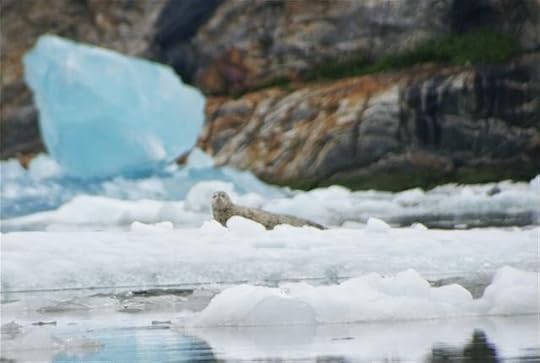
On a trip to Alaska: the brighter blues and ceding purples of dawn, the calving of ice (like a dynamite blast), the candy twist of fog between the breaks in hills, the lugubrious faces of seals, the fins and tails of whales, the naturalists and crew we won't soon forget, the Great Young Elly P and her brother Owen (oh, my!), the people it was easy to love (grandparents, a pair of brothers, a pair of sisters like sisters to me), and a song that traveled through the green rain of a spruce and hemlock forest, carried forward by blonde cousins.
Gillian and Sarah. Sarah and Gillian. On our boat, on our trails, in our hearts.
"We want to be in one of your novels," they said to me, at the very end, their two faces glowing beneath glow-golden hair.
"What sort of novel would that be?" I wanted to know, and they laughed (for they were capable of such laughter) and explained: A story in which big things happened. Unexpected things. Wow-worthy things. Secret powers lost and found. Adventures spinning forward. Not (most definitely not) one of those dreary novels in which description stands in for plot, character, and everything else.
Something has to happen, they said, they repeated.
They were emphatic. They were two smart girls with big, expressive eyes, and they were hopeful, insistent, ready for the next great book, a Sarah and Gillian book, a story about two girls caught in a fabulous whirl, or, perhaps, in one of their sweet-soprano songs (He sat by her window and smoked his cigar... He told her he loved her, but my how he lied... They were to get married but somehow she died... The tombstone fell over and squish-squash he died... The moral of this story is don't smoke cigars, don't smoke cigar ar ar ars.)
"You can even make me evil," Sarah offered, intuiting, perhaps, that my imagination might not be big enough, my skills not sufficiently wide ranging, my details too soggy for their high-adventure taste.
"Make you evil?" I said. "Impossible."
She laughed her Sarah laugh. Gilly laughed her cousin laugh. These two girls with adventure tastes offering everything they felt a writer might need—inspiration, encouragement, latitude.
Make something happen, they said.
Write the story, they said.
Put us in the heart of it.
They are out there now, and they are waiting. But if, someday, you see a story of mine with a Sarah and Gillian twist, you'll know this: I will have captured only a fraction of the gold that each of these cousins is.




Published on July 08, 2014 04:51
June 26, 2014
the book promotion circus: even Stephen Crane went a little nuts (and goodbye for now)
 Confession: There are a lot of us who die many small deaths during the act of promoting our books. We wish we didn't have to. We wish we were Michael Ondaatje or Alice McDermott or Colum McCann or any of the greats for whom the world both spins and waits, and not us, ourselves and ourselves only, who are easily forgotten, or never actually known.
Confession: There are a lot of us who die many small deaths during the act of promoting our books. We wish we didn't have to. We wish we were Michael Ondaatje or Alice McDermott or Colum McCann or any of the greats for whom the world both spins and waits, and not us, ourselves and ourselves only, who are easily forgotten, or never actually known.Book promotion. It can involve embarrassing displays of self-involvement (for the next sixty minutes I will be doing all the talking, thank you very much), nasty tricks (remember the writer who recently shipped her dead husband's ashes around with the galleys?), indulgent wardrobing (you will remember me, you must remember me, won't you remember me?), and bold pronouncements about one's own talent (eeewww). We are asked to do many things. We do what we can. We close our eyes, we (maybe) grin and (barely) bear it, and then, mercifully, the promotion season has passed. We can be ourselves again.
We can buy and celebrate the books of others.
I'm not a touring writer. I'm not a famous one. This here blog, which is dedicated primarily to writerly musings and the works of others during the bulk of the year and to the news it seems right to share following the release of the small books I write (forgive me, I beg you, forgive me), is my home base, my foundation, my brand, my world, my virtual me. There is also, for the record, a flesh and blood me—a somewhat innocuous middle-aged woman who has little to say in real life and surprises people who meet her for the first time.
Just ask dear Debbie who could not, on Tuesday night, at Books of Wonder, get over how short I actually am.
(You might have thought I was tall? You might have thought I was glamorous? Ha! Wrong on both counts. Plus, I don't have a memorable wardrobe.)
I think about this promotion thing sometimes. Indeed, not long ago, musing out loud, I told my agent that I had begun to feel pressure not to speak of myself anymore on my blog. That, if only I had much more time than I do, I'd spend all the blog language on others.
"But it's your own blog," she said, "and you have responsibilities to your books."
"I know," I said. "But. Still. People are talking."
I'm talking about all of this right now because I just read Caleb Crain's piece on Stephen Crane in this week's The New Yorker, "The Red and the Scarlet." It's a fine piece of biography and it doesn't need much of a preface; it stands, wildly, on its own.
But here's the part I'd like to excerpt for you. It's the late 1800s. We're looking at self publishing and self-promotion. Seriously. Has anything changed?
Unable to find a publisher, Crane scraped together the money for "Maggie" to be printed. He chose yellow covers and the pseudonym Johnston Smith, and his friends threw him a raucous party....
To advertise the book, Crane hired four men to read it as conspicuously as possible on the elevated train, which, unfortunately, had little effect on sales. "It fell flat," he later admitted."
Self promotion. It's a terrifying term.
I'm going to be taking a small respite from the blog for the next few days, for I have several books I've bought and am planning to read. I need a little reading time and space. And then I'm going to report back here, as my short and unglamorous self. I hope you'll return when I do.




Published on June 26, 2014 15:21










